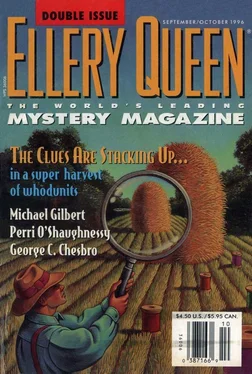Doug Allyn - v108 n03-04_1996-09-10
Здесь есть возможность читать онлайн «Doug Allyn - v108 n03-04_1996-09-10» весь текст электронной книги совершенно бесплатно (целиком полную версию без сокращений). В некоторых случаях можно слушать аудио, скачать через торрент в формате fb2 и присутствует краткое содержание. Город: Dell Magazines, Год выпуска: 1996, Издательство: Dell Magazines, Жанр: Детектив, на английском языке. Описание произведения, (предисловие) а так же отзывы посетителей доступны на портале библиотеки ЛибКат.
- Название:v108 n03-04_1996-09-10
- Автор:
- Издательство:Dell Magazines
- Жанр:
- Год:1996
- Город:Dell Magazines
- ISBN:нет данных
- Рейтинг книги:4 / 5. Голосов: 1
-
Избранное:Добавить в избранное
- Отзывы:
-
Ваша оценка:
- 80
- 1
- 2
- 3
- 4
- 5
v108 n03-04_1996-09-10: краткое содержание, описание и аннотация
Предлагаем к чтению аннотацию, описание, краткое содержание или предисловие (зависит от того, что написал сам автор книги «v108 n03-04_1996-09-10»). Если вы не нашли необходимую информацию о книге — напишите в комментариях, мы постараемся отыскать её.
v108 n03-04_1996-09-10 — читать онлайн бесплатно полную книгу (весь текст) целиком
Ниже представлен текст книги, разбитый по страницам. Система сохранения места последней прочитанной страницы, позволяет с удобством читать онлайн бесплатно книгу «v108 n03-04_1996-09-10», без необходимости каждый раз заново искать на чём Вы остановились. Поставьте закладку, и сможете в любой момент перейти на страницу, на которой закончили чтение.
Интервал:
Закладка:
Travel at my age and with my natural disinclination to stir from home was not the pleasure it had been in my younger days, but it could not be avoided.
My first journey had been back home to Deaconsfield, a trip I’d not made for several years, where I sought out Verity Bainbridge’s lawyer, a genial and forthcoming old gentleman now also living in retirement. I made no bones about my reasons for delving into the case, and I found Arthur Pembroke equally candid in answering my questions.
“You ask about her will,” he said, “and to answer that I must explain that Mrs. Bainbridge was confined to a wheelchair after suffering a grievous accident in her early eighties. Then, about five years before her death, she had the good fortune to be treated by an osteopathic surgeon in New York, a brilliant specialist who after a lengthy course of treatment and surgery restored the use of her legs.”
He went on to say that Dr. Agnew and his patient became close friends. “She gave generously to the work of his clinic, and in her will left it a sizable bequest, as well as a personal bequest to Agnew, whom she regarded as a miracle worker, of nearly a quarter million. The residue of her estate was distributed among a raft of charities.”
“So Agnew was the main beneficiary.”
“Among the individual legatees, yes. Regrettably, the doctor did not live long enough to enjoy his fortune. He contracted pancreatic cancer and was not expected to live more than a year at most. In fact, he survived Mrs. Bainbridge by only eleven months.”
“Had he died before Mrs. Bainbridge,” I asked, “where would the money have gone?”
“The clinic would have got it all.”
“And when he died soon after inheriting where did the money go then?”
“We didn’t represent Agnew, of course, but I seem to recall his being survived by a stepson in Canada.”
My eyes flew open at this disclosure. Andrew Lee Tibbetts was from Canada. Could he have been Agnew’s stepson? But I quickly dismissed the notion as entirely untenable. Surely in their investigation of the case the police would have explored this possible link and motive.
Feeling it to be a waste of time but with no other immediate inquiries in hand, I decided to follow this line a bit further, if only to tie up a loose end. I finally managed to track down Agnew’s New York lawyer; here my efforts were effectively balked. The lawyer, citing client confidentiality, refused to impart any information whatsoever.
It was time, I decided, to explore the other end of the path, and with this in mind I flew to Toronto and directed my inquiries to the university where, a transcript of Tibbetts’s trial had informed me, the chronic sleepwalker had been a test subject in a program of sleep dysfunction research, the findings of which were later to prove so decisive in establishing the fact of Tibbetts’s affliction.
That particular research project had been discontinued long ago, but I was able to interview, on the pretext of my writing a book on the case, the former director of the program, a physiologist named Angus McGill. He astounded me by revealing that in his opinion, despite there having been no overt behavioral pattern to support it, Tibbetts was a borderline psychotic.
“Somnambulism,” he explained, “has been linked to epilepsy, parkinsonism, imminent psychosis, and dissociation of personality, among other abnormalities.”
“Yet sleepwalking itself is not considered a form of mental illness, true?”
“True. Otherwise Tibbetts might have been judged guilty by reason of insanity and confined to an institution.”
He described Tibbetts as an otherwise unexceptional young man, good-looking, charming, and feckless. “Of course, Tibbetts was only one of our test subjects. It’s too bad Manly Renard isn’t still around — one of my lab assistants on the program. He and Tibbetts became pals of a sort during the course of the project.”
“Any idea where I can locate him?” I asked.
“Sorry. We lost track of him after he left the university to complete his studies in the States.”
In nosing around the area where Tibbetts had lived at the time, I came upon an old neighbor, a garrulous widow named Rosemary Welland-Jones, who had known the family well and had some interesting things to say even if they didn’t advance my investigation, at least at first.
“Giselle,” she told me, “Andy’s wife, was a sweet little thing. She was from Montreal, where they met. Andy was a good-looking lad and she was madly in love with him, despite his problems.” She used McGill’s word for him: feckless. “You know the type. One job after another. Grass always greener somewhere else. Quite suddenly, they moved to the States. We never heard anything more about them until the murder. Didn’t know they’d moved back here until one day I happened to run into Giselle at the Eaton Center. She told me she and Andy had split up two years after they returned — she didn’t say why — and that she’d remarried. I think she said his name was Donohue and they were living in Scarborough.”
Giselle Donohue proved far more approachable than I’d dared hope. Perhaps the passage of time had disarmed her suspicions, or perhaps she found nothing to arouse her distrust in this diffident, elderly professor who landed on her doorstep with his story of writing a book about the sleepwalker case. She was not unwilling to discuss it. I asked her how they’d happened to move to the States, and why Deaconsfield of all places.
“Andy Lee,” she said, “was given to sudden impulses, always expecting things to be better somewhere else. They never were. One day he came home and said he wanted to try the States. Said he had a distant cousin living in Deaconsfield. He’d never before mentioned any relatives in the States and when we got there he could find no trace of this cousin. For all I know he never existed. At first, though, things went fine. Andy Lee got a job in a service station and seemed happier than he’d been in months. We even made a few friends.”
“The sleepwalking, did that continue?”
“Oh yes, we were both used to that. We lived with it. Then suddenly, overnight, it all ended in that terrible nightmare.”
“You must have been vastly relieved when he was acquitted.”
“It seemed a miracle. Of course we couldn’t stay down there, people were not — friendly. We moved back here, and then when the money came it seemed like another miracle.”
“The money?”
“As if out of the blue,” she said. “I came home from work one day and found Andy Lee wildly excited. He said we were rich — well, rich for us. He showed me a bank book with a deposit of fifty thousand dollars. Said he’d wanted to keep it all a secret — he was the most secretive man on earth — until he was certain it was for real. It seems that an agent acting on behalf of some movie producer in the States had approached Andy — all unbeknownst to me — and offered him fifty thousand dollars for the film rights to his story.”
I could hardly contain my excitement. “Do you remember the agent’s name — or the movie producer’s?”
She shook her head. “No, I don’t. So far as I know nothing ever came of it. But Andy Lee changed after that. The money went to his head. He started gambling and drinking. It went from bad to worse, until finally I couldn’t stand it anymore. I moved out. After the divorce I never heard from Andy Lee again.”
Before leaving I brought up the subject of Andrew Lee’s participation in the sleep disorder program. She said that he hadn’t wanted to talk much about that. “I think he rather resented being a guinea pig, so to speak, even if it made him feel somehow important — special — at the time.”
Читать дальшеИнтервал:
Закладка:
Похожие книги на «v108 n03-04_1996-09-10»
Представляем Вашему вниманию похожие книги на «v108 n03-04_1996-09-10» списком для выбора. Мы отобрали схожую по названию и смыслу литературу в надежде предоставить читателям больше вариантов отыскать новые, интересные, ещё непрочитанные произведения.
Обсуждение, отзывы о книге «v108 n03-04_1996-09-10» и просто собственные мнения читателей. Оставьте ваши комментарии, напишите, что Вы думаете о произведении, его смысле или главных героях. Укажите что конкретно понравилось, а что нет, и почему Вы так считаете.












